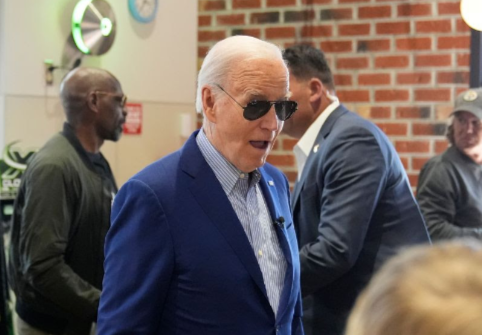Biden Files Lawsuit Against Chain the Same Day He Visited

President Joe Biden made a stop at a Sheetz location on Wednesday to buy snacks during a campaign swing through Pennsylvania, coinciding with his Equal Employment Opportunity Commission filing a lawsuit against the company and its subsidiaries.
It appears that either the president was unaware that his administration had accused Sheetz of racial discrimination against job applicants, or he chose to overlook it.
The nature of the claim against the company raises questions, as highlighted in the lawsuit filed by the EEOC.
'According to the lawsuit, Sheetz has had a longstanding practice of screening job applicants for criminal convictions and then denying employment based on those records,' the EEOC stated in a news release.
This screening resulted in a 14.5 percent rejection rate for black applicants, compared to 13.5 percent for 'multiracial' applicants, 13 percent for Native Americans, and nearly 8 percent for whites.
Although the EEOC did not accuse Sheetz of deliberate racism, federal law prohibits hiring practices that disproportionately affect minorities.
Even if criminal background checks are deemed necessary, they could still be unlawful if alternative methods ensuring safety without discriminatory effects exist, according to an EEOC lawyer.
However, the EEOC's statement did not propose such alternatives.
Sheetz contested the lawsuit, which seeks to compel the company to offer jobs to unlawfully rejected applicants and provide back pay, retroactive seniority, and other benefits, as reported by The Associated Press.
This could pose a significant challenge, given that the EEOC claims Sheetz's alleged discriminatory hiring process has been ongoing for nearly a decade.
During his visit, Biden appeared unaware of any racial disparities in Sheetz's workforce or customer base.
It's worth noting that Biden's awareness of his surroundings may not be the most accurate gauge of actual circumstances.
Sheetz responded by stating that it 'does not tolerate discrimination of any kind,' emphasizing its commitment to diversity and inclusion, according to company spokesman Nick Ruffner's statement to the AP.
The full EEOC news release, titled 'EEOC Sues Sheetz, Inc. For Racially Discriminatory Hiring Practice,' is included below.
BALTIMORE – Sheetz, a large convenience store chain, violated federal law by denying employment to a class of job applicants because of their race, the U.S. Equal Employment Opportunity Commission (EEOC) charged in a lawsuit filed today.
The EEOC filed suit against Sheetz, Inc.; Sheetz Distribution Services, LLC; and CLI Transport, LP (collectively, Sheetz), which together operate a chain of convenience stores with over 600 locations in six states. According to the lawsuit, Sheetz has maintained a longstanding practice of screening all job applicants for records of criminal conviction and then denying them employment based on those records.
The EEOC charges that Sheetz’s hiring practices disproportionately screened out Black, Native American/Alaska Native and multiracial applicants. Sheetz’s companywide hiring practices violated provisions of Title VII that prohibit disparate impact discrimination, the EEOC says. The lawsuit does not allege that Sheetz was motivated by race when making hiring decisions.
Such alleged conduct violates Title VII, which prohibits facially neutral employment practices that cause a discriminatory impact because of race when those practices are not job-related and consistent with business necessity or where alternative practices with less discriminatory impact are available. The EEOC filed suit in U.S. District Court for the District of Maryland, Northern Division (U.S. EEOC v. Sheetz, Inc., et al., Civil Action No. 1:24-cv-01123-JKB, after first attempting to reach a pre-litigation settlement through its conciliation process.
“Federal law mandates that employment practices causing a disparate impact because of race or other protected classifications must be shown by the employer to be necessary to ensure the safe and efficient performance of the particular jobs at issue,” said EEOC Regional Attorney Debra M. Lawrence. “Even when such necessity is proven, the practice remains unlawful if there is an alternative practice available that is comparably effective in achieving the employer’s goals but causes less discriminatory effect.”
EEOC Philadelphia District Office Director Jamie R. Williamson said, “This highlights the significance of the observance of April as Second Chance Month, underscoring our nation’s commitment to reintegrating individuals with criminal records into society by ensuring they have fair access to employment and other essential services. To that end, the EEOC is dedicated to making sure that individuals with criminal records are not unlawfully excluded from employment opportunities because of race.”